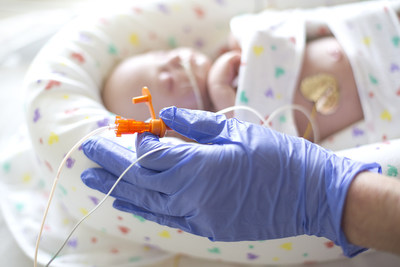Clinical Study using Philips InnerSense solution aligned with World Prematurity Awareness Month
ANDOVER, Mass., Nov. 12, 2014 /PRNewswire/ -- To mark the 2014 Prematurity Awareness Month, Royal Philips (NYSE: PHG AEX: PHIA) and Duke University School of Nursing today announced a research collaboration to execute a first-of-its-kind study on the impact of continuous core temperature monitoring on very low birth weight infants. The study will use Philips InnerSense – the only dual-function device available in the U.S. that embodies an esophageal temperature probe and a feeding tube – to continuously monitor the infant's core temperature from birth through the first 24 hours of life. Continuously monitoring core temperature allows the caregiver to actively manage the infant's temperature during this vulnerable period where heat loss is prevalent. Philips InnerSense has received FDA 510(k) clearance and is currently marketed in the USA and internationally.

"Monitoring core temperature is critical for caregivers in helping to reduce mortality and morbidity among infants," said Michael Mancuso, CEO, Patient Care and Monitoring Solutions, Philips Healthcare. "The Philips InnerSense technology provides caregivers with critical and relevant temperature measurement data when they need it most, while minimizing frequent disruptions and keeping infants comfortable."
Infants born below 1,500 grams (3 lbs. 3 oz) in weight often experience hypothermia after birth, due to a metabolic inability to keep warm while their bodies lose heat during initial stabilization. Temperature changes can be sudden and dramatic, and skin temperature sensors or axillary spot checks may not accurately reflect internal changes. Continuous core temperature monitoring has been a challenge for caregivers due to lack of access to accurate and comfortable measurement devices designed specifically for very low birth weight preemies.
The Philips-Duke University School of Nursing study, entitled "Temperature Monitoring with InnerSense Esophageal Oral Gastric Tube After Birth Through Stabilization in Very Low Birth Weight Infants," will analyze the impact of continuous core temperature monitoring, helping clinicians gain insight into a baby's condition. The study will evaluate the extent to which such monitoring allows clinicians to make more informed decisions about the care the infants need, and whether such monitoring potentially prevents excessive heat loss.
"Low birth weight infants require stabilization procedures that make it difficult for nurses to assess their body temperature using thermometers or skin probes," said Robin Knobel, PhD, RN, FAAN, Duke University School of Nursing, and lead researcher for the study. "With this study, we hope to demonstrate how continuous, real-time temperature monitoring can provide clinicians with a wealth of information on the infant's body temperature, helping to prevent hypothermia and provide optimal care."
The Philips-Duke study will be conducted over two years, with enrollment starting in January 2015.
For more information on Philips advanced technology solutions for mother and child care, visit www.philips.com/motherandchild. Follow the conversation on Prematurity Awareness on Twitter at #WorldPrematurityDay.
For further information, please contact:
Kathy O'Reilly
Philips Healthcare
(o) 978-659-2638 (mobile) 978-221-8919
Kathy.oreilly@philips.com@kathyoreilly
Michael Evans
Director, Marketing and Communications
Duke University School of Nursing
(o) 919-684-9356 (fax) 919-668-3581
michael.evans2@duke.edu
About Royal Philips:
Royal Philips (NYSE: PHG, AEX: PHIA) is a diversified health and well-being company, focused on improving people's lives through meaningful innovation in the areas of Healthcare, Consumer Lifestyle and Lighting. Headquartered in the Netherlands, Philips posted 2013 sales of EUR 23.3 billion and employs approximately 115,000 employees with sales and services in more than 100 countries. The company is a leader in cardiac care, acute care and home healthcare, energy efficient lighting solutions and new lighting applications, as well as male shaving and grooming and oral healthcare. News from Philips is located at www.philips.com/newscenter.
About Duke University:
A diverse community of scholars and clinicians, Duke University School of Nursing is educating the next generation of transformational leaders in nursing. We advance nursing science in issues of global importance and foster the scholarly practice of nursing. In 2011, U.S. News and World Report ranked Duke among the top seven graduate schools of nursing in the nation. Duke University School of Nursing also ranks ninth in National Institutes of Health awards among U.S. schools of nursing. The School offers masters, PhD and doctor of nursing practice degrees, as well as an accelerated bachelor of science in nursing degree to students who have previously graduated from college. Learn more about the Duke University School of Nursing at nursing.duke.edu.
Photo - http://photos.prnewswire.com/prnh/20141111/158015
Photo - http://photos.prnewswire.com/prnh/20141111/158016
Logo - http://photos.prnewswire.com/prnh/20140122/NE50581LOGO
SOURCE Royal Philips